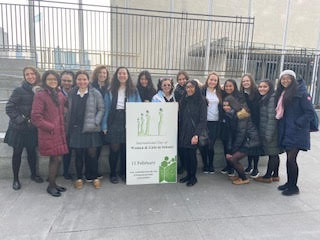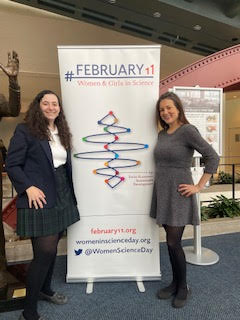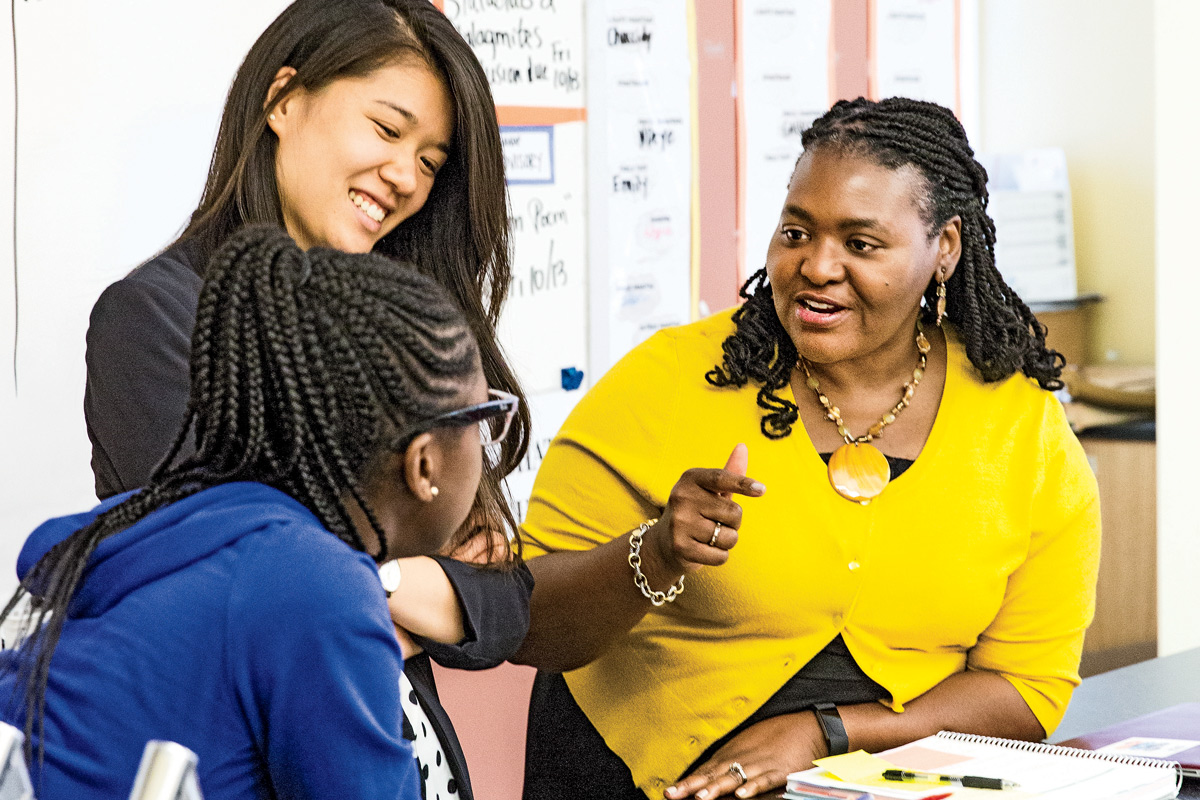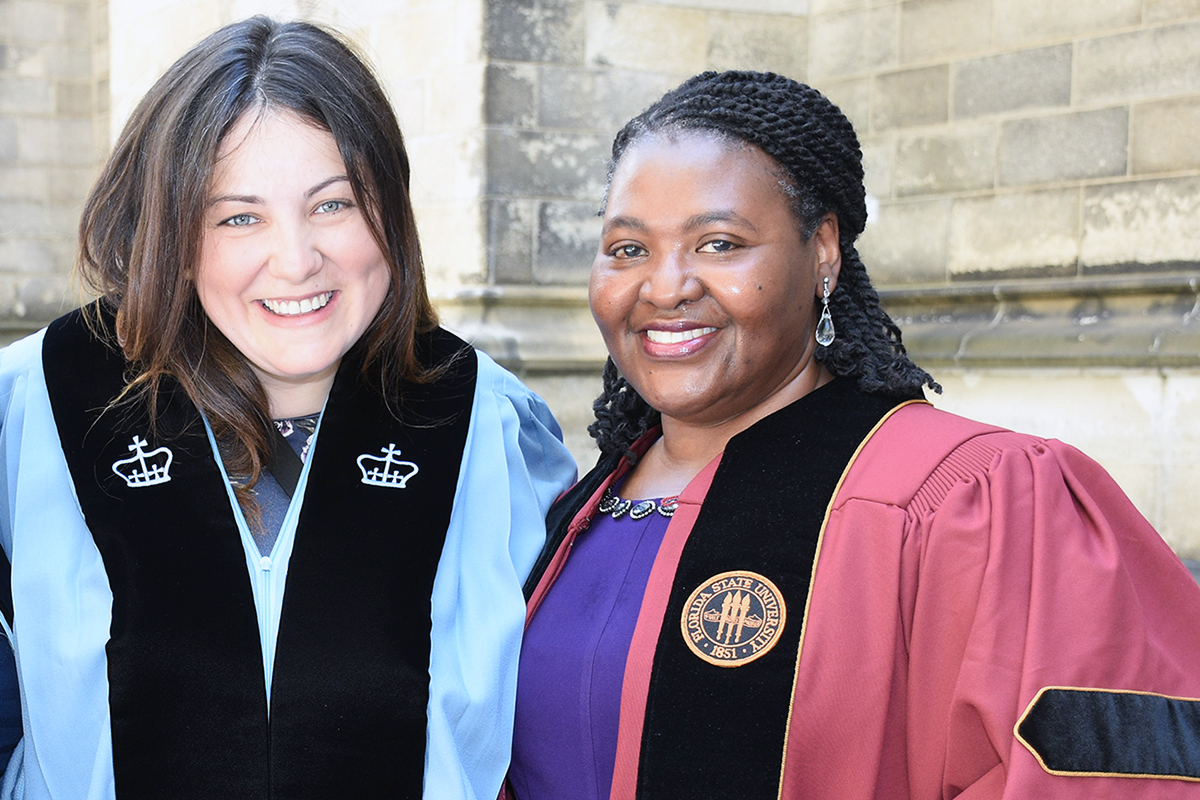A chapter coauthored by Felicia Mensah, Professor of Science Education, and her former TC doctoral student Lauren Serpagli (Ed.D. ’17; M.Ed. ’15, M.A. ’05), a New York City high school teacher, is featured in a new book released on February 11th as part of the fifth annual International Day of Women and Girls in Science.
Increasing the participation of women in science, technology, engineering and mathematics (STEM) is a focus of the United Nations Sustainability Goals.
Today, just 30 percent of researchers worldwide are women, and only 35 percent of all students enrolled in STEM related fields of study are women. Recent studies have found that women in STEM fields publish less, are paid less for their research, and do not progress as far as men in their careers. Girls are often made to believe they are not smart enough for STEM, or that boys and men have natural affinity for the field.
Only 35 percent of all students enrolled in STEM related fields of study are women. Recent studies have found that women in STEM fields publish less, are paid less for their research, and do not progress as far as men in their careers.
The book, February 11: The International Day of Women and Girls in Science, breaks new ground in highlighting the role of women in science for sustainable development, February 11 is published by the Royal Academy of Science International Trust (RASIT), based in New York City, which is directed by Nisreen El-Hashmemite, an Iraqi princess, scientist and physician who is a researcher at Brigham and Women’s Hospital/Harvard Medical School. El-Hashmemite co-edited the book, which includes chapters from a range of authors, including a 15-year-old British high school student.
The book was the focus of a discussion at the International Day of Women and Girls in Science Assembly, held on February 11th at the United Nations headquarters in New York, that was led by El-Hashmemite and Camille Schrier, Miss America 2020, a doctoral student in pharmacy. Serpagli was in attendance with a group of girls from her school.

FIELD-BUILDING TRIP Serpagli brought students from her AP biology class at Dominican Academy High School to the UN for the International Day of Women and Girls in Science. (Photo courtesy of Lauren Serpagli)
In their chapter, “Investing in Science and Technology Education for Shaping Society’s Future: Focusing on the Girls,” Mensah and Serpagli argue that current efforts to involve more women in STEM focus too narrowly on increasing economic competitiveness – a rationale that isn’t working, the authors suggest, because, on its own, it fails to widely engage the interest of women and girls.
“Moving beyond competitiveness toward enhancing the lives of young girls and women along with their interests is an equally important goal for offering a quality STEM education,” Mensah and Serpagli write.
Moving beyond competitiveness toward enhancing the lives of young girls and women along with their interests is an equally important goal for offering a quality STEM education.
— Felicia Mensah and Lauren Serpagla
“We also focus on science and technology for lifelong learning and how we can create opportunities for career development,” Mensah said in a recent interview.
The authors also call for “a framework of technology for social inclusion” that focuses on education in which “girls are included and not hindered from experiencing the benefits of technology in their lives” and experiencing “active participation in their learning with technology.

NEXT LINK IN THE MENTOR CHAIN Serpagli says that Mensah has transformed her approach to working with students such as Rachel Hartmann. (Photo courtesy of Lauren Serpagli)
“The argument here is that the use of new digital platforms to engage and encourage girls and young women serves to subvert the inherently biased curriculum and cultural norms within the STEM disciplines” – particularly those that have excluded women from diverse cultural backgrounds.
The argument here is that the use of new digital platforms to engage and encourage girls and young women serves to subvert the inherently biased curriculum and cultural norms within the STEM disciplines.
— Felicia Mensah and Lauren Serpagli
To that end, the chapter draws on a study by Serpagli, who serves as STEM Department Co-Chair at Dominican Academy High School on Manhattan’s Upper East Side. Building on her TC dissertation, Serpagli assessed the use of social media – specifically, Twitter and Instagram – to “make science relevant to female students and encourage them to thrive.”
“When I was invited to submit this paper, I immediately thought, ‘This can help promote my students,’ and Lauren, with her experience in an all-girls high school and her interest in technology, was the perfect partner,” Mensah says.
For her part, Serpagli says that Mensah “is well respected in her field for her knowledge, but at TC, she’s known for how she supports and lifts up everyone around her.”

ON THE FRONT LINES Mensah has worked with faculty and students in New York City schools. With her, from left, in 2017: Trinity Faulkner, a student at Teachers College Community School, and science teacher Jenny Shen. (Photo: TC Archives)
Mensah “transformed my approach to my classes and students,” says Serpagli “She helped me realize that there are so many ways to present ideas to students, and that students really benefit from these different methods.”
Mensah’s research addresses issues of diversity, equity and identity in science teacher preparation and teacher professional development. She was named the 2017 Outstanding Science Techer Educator of the Year by the Association for Science Teacher Education and received the 2012 Early Career Award in Teaching and Teacher Education from the American Educational Research Association. She recently was named co-editor of the Journal of Research in Science Teaching (JRST).
[Read a message to JRST readers by Mensah and her co-editor, Troy D. Sadler, in which they lay out their vision for the journal during their tenure.]
Serpagli, who teaches biology and advanced placement biology, received the 2019 Archdiocesan Exemplary New York Catholic High School Educator Award. She also is an Adjunct Assistant Professor at CUNY Hunter College.
